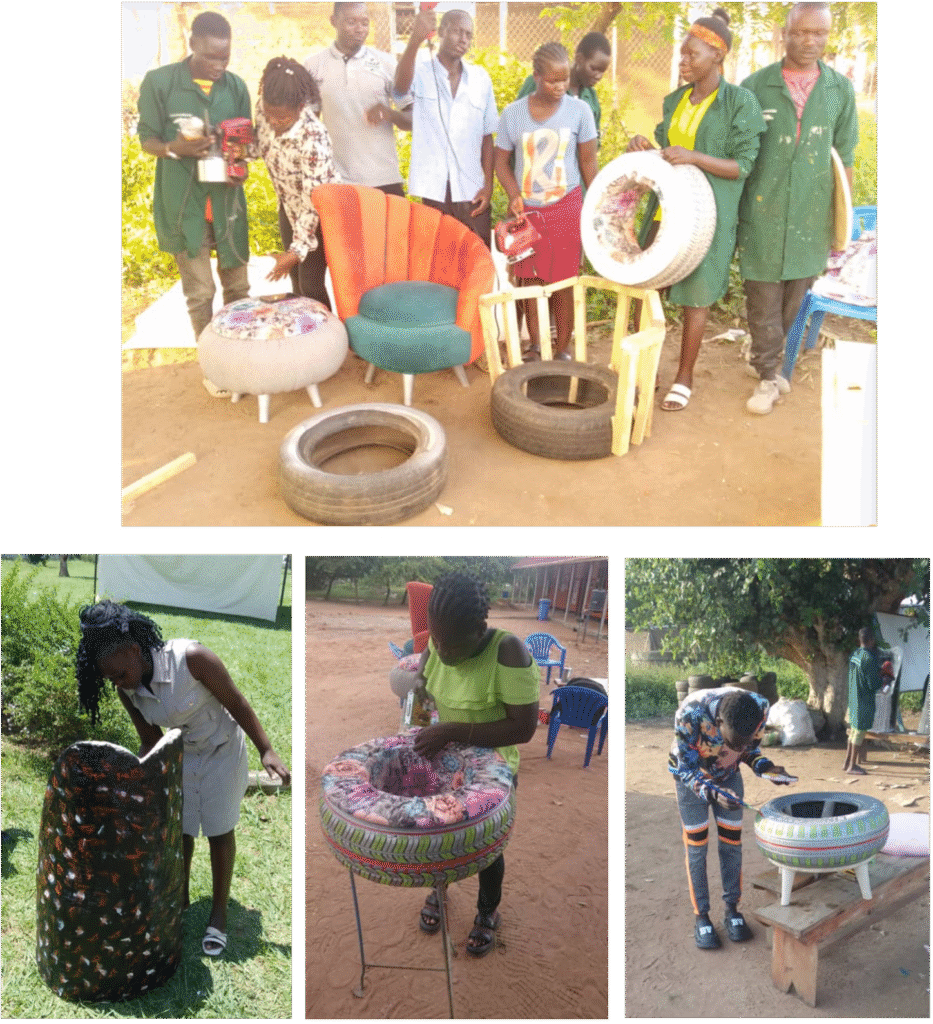
The Problem and Motivation Behind
Malesh Juma Jamal, a 24-year-old youth, lives in the Agojo Refugee Settlement, Adjumani, Uganda, where he witnessed first-hand wastes are badly mismanaged and scattered everywhere in his community. Plastic bottles, discarded tyres, and off-cast clothing were either dumped haphazardly or burned, causing severe environmental hazards. Water lines became blocked with waste, leading to contaminated water sources, while burning tyres released toxic fumes that polluted the air and posed health risks. “I thought, how can we reduce this? How can we properly manage waste?” Jamal recalls. He knew there had to be a better way—one that could protect the environment while also providing economic opportunities for young people.
Beyond the environmental challenges, life in the settlement was extremely tough. Having fled his home country, Jamal faced financial hardship. “Getting money was hard. We depended on receiving aids, but even buying soap was difficult,” Jamal says. Dropping out of school due to financial struggles, he turned to his artistic talents and creativity as a way to make a living. This sparked an innovative idea: why not turn waste into sellable products?
The Innovative Solution
When Jamal and his team joined the Youth Innovation Lab, under the EU-funded Project RED, they chose to address the problem of waste management and recycling. They formed a group, called Agojo Youth for Development, that focused on recycling waste materials into functional and artistic products. Their solution involves three main activities:
- Collecting and Sorting Waste: They set up designated waste collection bins throughout the settlement, encouraging the community to properly dispose of plastic, tyres, and boxes.
- Upcycling Waste into Useful Products: The team creatively transforms waste into marketable items such as:
- Earrings and decorative flowers made from plastic bottles.
- Chairs, tables, and sofa sets crafted from tyres and cardboard boxes.
- Doormats and other home décor items made from discarded clothing.
- Community Awareness Campaigns: The group actively educates residents about the importance of proper waste disposal and the dangers of pollution. “People didn’t realise that plastic bottles take over 500 years to decompose. We tell them that instead of throwing them away, they can be turned into something valuable,” Jamal explains.
Lessons Learned from Addressing Challenges
- Conducting awareness campaigns to change community habits: Some community members were resistant to changing their waste disposal practices. The group addressed this by conducting awareness campaigns about the economic and environmental benefits of recycling, gradually encouraging better practices. Conducting awareness campaigns helps build community support and changes long-standing habits.
- Exploring alternative power solutions to address energy issues: Power shortages affected their ability to use machines consistently. To mitigate this, the group explored solar-powered battery systems to ensure uninterrupted production.
- Setting up a savings plan to tackle transport challenges: Transporting finished products to markets was costly and time-consuming. To address this, the group developed a savings plan to purchase a tricycle, making distribution easier and more affordable.
- Being alert not to encourage children dropping out of school: In-school children expressed a high interest in joining the training on waste recycling, but the group was concerned that this might encourage them to prioritise making income over attending school. Therefore, the group decided to give priority to training out-of-school youth. However, this decision might not be entirely sound, as it could inadvertently limit opportunities for in-school youth who are genuinely interested in learning new skills. Nonetheless, it reflects the group’s thoughtful and responsible approach to youth development, demonstrating their commitment to protecting children’s education.
Next Steps and Future Aspirations
Jamal envisions expanding their awareness raising activities and educate more youth about waste recycling skills. “I don’t want to be selfish with these skills … If I train five, and they each train five, we can build something bigger than ourselves.” Jamal says. To realise this vision, Jamal and his team has a plan of the following steps:
- Building a Larger Workshop: Creating a permanent recycling hub as their current space is too small.
- Strengthening Market Access: Partnering with more organisations and businesses to widen their customer base.
- Scaling Up Production: Acquiring more machines to increase their recycled products.
- Expanding Training Programs: Training more out-of-school youth to support them to earn income.